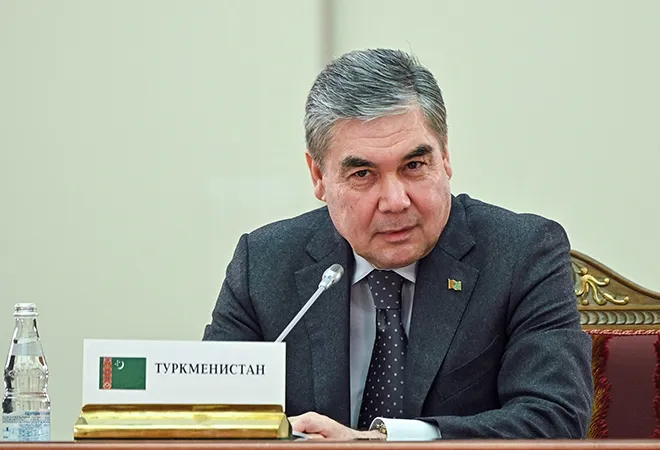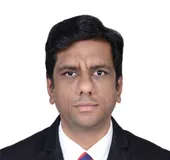-
CENTRES
Progammes & Centres
Location
Will a new leadership bring about the much-required change in Turkmenistan as it battles a severe economic and food crisis?

Turkmenistan is set to hold an early presidential election on 12 March after President Gurbanguly Berdymukhamedov at the session of the Khalk Maslahaty (People’s Council) indicated that he is stepping down so that the political power can be turned over to “young leaders” though, he intends to remain as the Chairman of the Parliament’s Upper Chamber. At his insistence, the Parliament proclaimed that the snap election be held early this month. President Berdymukhamedov, who is also the Prime Minister of the former Soviet republic and the Speaker of the Upper House of the Parliament, was re-elected to a seven-year term in 2017 and has been the President of the Central Asian state since 2006, with no constructive opposition in place. His son, Serdar Berdymukhametov, is expected to succeed him.
Serdar Berdymukhametov was nominated by the Congress of the ruling Democratic Party of Turkmenistan as the presidential candidate, with the Central Election Commission opening the nomination process for the three registered political parties.
The elections are taking place at a time when the country is facing severe economic crisis. The prolonged conditions of low prices of hydrocarbon coupled with the country’s outstanding debt to Beijing and competition from other global gas-producing states has compounded Turkmenistan’s dire economic situation. Though protests are uncommon in the country, the recent unrest in Kazakhstan over growing socio-economic inequalities has also perturbed the country’s leadership.
The Election Commission in Ashgabat announced last week that the registration of candidates for the presidential election is completed with nine candidates, including Serdar Berdymukhametov. Apart from the Democratic Party of Turkmenistan, the other two registered parties in the country are the Agrarian Party of Turkmenistan and the Party of Industrialists and Entrepreneurs of Turkmenistan. These parties are known to be loyal to the ruling party and support the incumbent President.
Many international observers have raised concerns and remain sceptical about the freedom of elections in the state. The Organisation for Security and Co-operation in Europe (OSCE), who monitored the 2018 Parliamentary election, noted that the elections “lacked important prerequisites of a genuinely democratic electoral process”.
The Central Commission for Holding Elections and Referendums stated that the other eight candidates are Babamurat Meredov, of the Party of Industrialists and Entrepreneurs of Turkmenistan, Agajan Bekmuradov, of the Agrarian Party of Turkmenistan, and six other candidates nominated by initiative groups—Maksatmurat Ovezgeldyev, Kakageldy Saryev, Berdymammet Gurbanov, Perhat Begenjov, Maksat Odeshov, and Hydyr Nunnaev. Four opposition activists and politicians who are in exile—Ahmet Rahmanov, Murat Gurbanov, Geldy Kyarizov, and Nurmuhammet Annaev also intend to take part in the presidential election, but their candidacy remains in question as they are barred from entering Turkmenistan.
Murad Kurbanov, the self-exiled leader of the unregistered opposition party, Democratic Choice of Turkmenistan, criticised the authorities for purposely leaving the potential candidates with no time to register or campaign for the vote. The country has also barred its citizens living abroad from voting in the election.
Many international observers have raised concerns and remain sceptical about the freedom of elections in the state. The Organisation for Security and Co-operation in Europe (OSCE), who monitored the 2018 Parliamentary election, noted that the elections “lacked important prerequisites of a genuinely democratic electoral process”. A meeting was held in Ashgabat last month between Turkmenistan authorities and OSCE on the issues of preparation for the forthcoming presidential elections.
Rumors were rife for about a year in Turkmenistan that Berdymukhammedov had planned to transfer power to his son, Serdar. He turned 40 last year, the minimum age required under the Constitution to be the President. Since 2018, Serdar maintained a streak of important ranks in the government, when he was made the Deputy Foreign Minister. In January 2019, he became the Deputy Governor of his native Ahal province, and was made Governor five months later. For about a year, Serdar served as the Industry Minister before leaving that position in February 2021, to serve as the Deputy Prime Minister and oversee the economic affairs portfolio. Last year, he was appointed the Deputy Chairman of the Cabinet of Ministers, managing economy, banking, and liaising with international financial institutions. He additionally served as Turkmenistan’s representative to the Economic Council of the Commonwealth of Independent States, and was put in charge of the Balkan region.
Since then, he has embarked on numerous official visits mainly focusing on post-Soviet countries. He also visited Japan during the 2021 Olympics games, while travelling to China, Iran, and the Glasgow climate summit as well. Serdar also serves as the Chair of the Turkmen-Japanese, the Turkmen-Russian, and Turkmen-Chinese intergovernmental cooperation commissions.
Turkmenistan is immensely rich in natural reserves, accounting for about t10 percent of the world’s gas reserves. However, the country’s economy does not paint a very bright picture. Hydrocarbon accounts for nine-tenths of Turkmenistan’s export earnings and the 2014 fall in world hydrocarbon prices has considerably crippled the economy since then. The Central Asia-China gas pipeline, through which Turkmenistan exports gas to China is also close to its maximum volume. This resulted in a weak social welfare system, thereby, impacting the already ailing education and health infrastructure also aggravating the food insecurity. The grim economic situation has also exacerbated the issue of massive unemployment amongst young Turkmen, currently estimated at 60 percent. The rising inflation and steep devaluation of its currency has also added to the country’s economic quagmire. The lack of diversification of the economy coupled with the lack of economic reforms has stagnated the economy. The dismissive response and mishandling of the coronavirus pandemic and government’s clumsy response to the hurricane that hit the eastern province, causing severe damage, triggered a wave of anti-government protests by those living abroad and some small-scale protests inside the country.
With the lack of democratic and economic reforms, coupled with an information vacuum and signs of growing popular dissatisfaction, the Turkmenistan model is visibly more fragile than it was more than two decades ago.
Over the last decade, Ashgabat has progressively been dependent on Beijing as it is the most important market for Turkmen gas. China has also been prominent in providing loans; thus allowing Beijing to have considerable leverage over Turkmenistan. According to the International Monetary Fund (IMF), exports to China have risen even more rapidly with an increase of more than 18 percent year-on-year. The relations between Ashgabat and Moscow have been rather fractious after the 2009 explosion that struck the Central Asia-Tsentr-4 pipeline that connects Turkmenistan to Russia.
There is little or no enthusiasm in the Turkmenistan electorate about the upcoming snap elections. Turkmens remain unconvinced that the outcome of the vote would bring about a visible change in their lives. Ashgabat’s international engagement is likely to remain modest even after Serdar’s likely win in the presidential election. With the lack of democratic and economic reforms, coupled with an information vacuum and signs of growing popular dissatisfaction, the Turkmenistan model is visibly more fragile than it was more than two decades ago. Unsurprisingly, the indifferent Turkmens are labelling the vote as the ‘Serdar’ election.
The views expressed above belong to the author(s). ORF research and analyses now available on Telegram! Click here to access our curated content — blogs, longforms and interviews.

Pritish Gupta is a graduate of Jindal School of International Affairs. Heformerly worked as a research intern with ORFs Eurasian Studies initiative.His research focuses on ...
Read More +